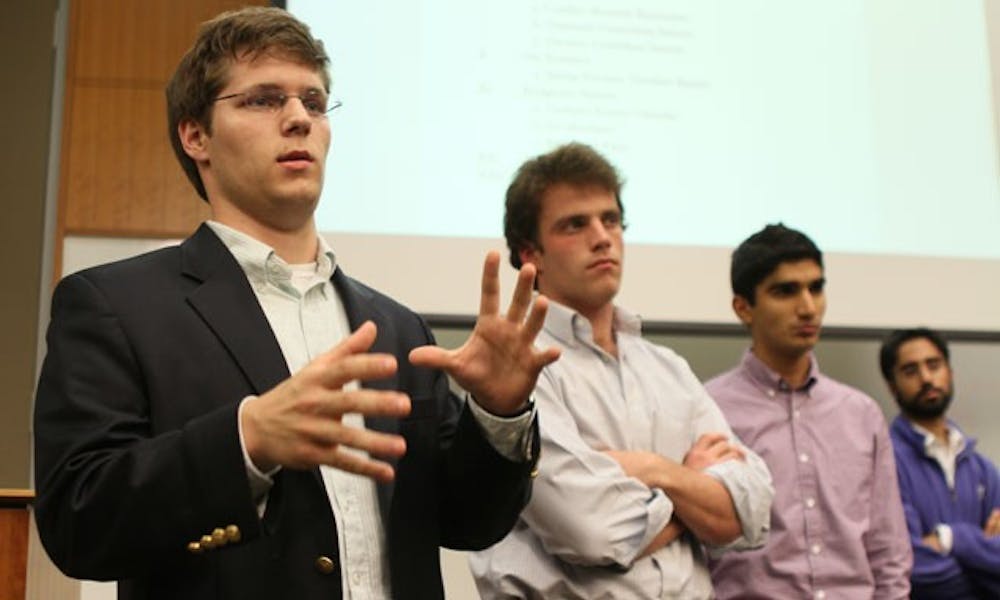Duke Student Government is considering amendments to its campaign and election processes.
The Senate considered a statute requiring an increased number of student signatures for candidate declarations at its meeting Wednesday night. The statute sought to reform Senate elections by increasing the required signatures for candidate declarations from 50 to 100 students, as well as requiring candidates to hold public events to reach out to student voters.
Sophomore Fedja Pavlovic, senator for residential life and dining and the member who proposed the statute, said the measure was an effort to increase voter turnout and candidate quality.
“I believe that voter turnout is low compared to other universities,” Pavlovic said. “One of the problems that I think stops people from voting is that there are too many campaigns [going on at one time].”
Ultimately, the statute was voted down, 18-21-1.
Executive Vice President Gurdane Bhutani, a junior, reintroduced a proposal for a new timeline for DSG elections. The amended timeline would move Senate elections to the same schedule as executive board elections in the Spring.
“This sort of gets all of the DSG stuff out of the way in one swoop,” Bhutani said.
The proposal was tabled to next week.
DSG also unanimously passed the “Conflict-Free Campus Initiative.”
The initiative recommends that Duke be added to the list of universities teaming up with the Enough Project, a nonprofit dedicated to ending genocide and crimes against humanity as well as curbing the use of conflict minerals. Sophomore Stefani Jones, senator for athletics, services and the environment, proposed the resolution to advise Duke to move away from partnering with corporations that use conflict minerals in production.
Conflict minerals are minerals mined in conditions of armed conflict and human rights abuse, most notably in the Democratic Republic of the Congo, according to the Enough Project’s website.
Jones said investing in corporations that use non-conflict minerals in production would help those suffering in Africa, explaining the economics behind the conflict in particular.
“The violence there is primarily funded by the minerals,” she said. “If you’re eliminating the economic incentive for war, you’re eliminating the [driving force].... We are creating consumer demand for non-conflict minerals.”
Jones said she hopes the resolution would act as a step toward aiding those being killed in the Congo today.
“The conflict in the Congo is the deadliest war since World War II,” she noted. “This is something that’s really important.”
Freshman Emily Feng, senator for athletics, services and the environment, said she supported the resolution but brought up Duke Athletics’ corporate sponsorships, noting it could pose a conflict of interest.
Jones said current sponsorships would not play a role.
“It’s a nation-wide movement: Stanford’s done it, Cornell’s done it, Penn’s done it,” she said.
In other business:
Senator for Student Life Leilani Doktor, a sophomore and a columnist for The Chronicle, raised the issue of funding ice machines on East and Central campuses. The $4,000 will provide for one machine in the East Union Building and another in Mill Village on Central Campus. She noted that although there are six machines on West Campus, students living elsewhere do not have the same amenities.
The resolution to suggest funding the two ice machines passed, however, DSG is looking into other funding options aside from its surplus budget.
The last order of business was a resolution to pay for repainted bike lanes around campus. External Chief of Staff Chris Brown, a junior, said the lanes are a matter of necessity for student safety and also connected the lanes to Duke’s effort at sustainability.
“In the context of pushing for a number of sustainable programs... we need to make sure the proper infrastructure is in place to make this possible,” Brown said.
The resolution passed unanimously and states that DSG will contribute $10,000 to fix the bike lanes throughout Duke.
Get The Chronicle straight to your inbox
Signup for our weekly newsletter. Cancel at any time.

